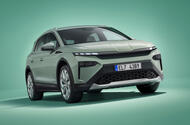Skoda’s new Elroq EVz is priced to compete with Chinese rivals
Czech company’s sales and marketing chief warns China will just set up shop in Europe
Any tariffs on Chinese electric cars will have “no effect” in slowing their march into the European market, Skoda’s sales and marketing chief has warned.
The EU will today vote to make the temporary tariffs on Chinese manufacturers – including BYD, Chery (owner of Omoda and Jaecoo), Geely (owner of Lotus, Polestar, Smart and Volvo) and SAIC (owner of MG) – permanent.
Currently, SAIC is charged an extra 37.6% on the wholesale price of imported EVs on top of the 10% that it was already required to pay, BYD is charged an extra 17.4% and Geely is hit with an extra 19.9%.
“We don’t think that the tariffs can solve the situation,” Martin Jahn told Autocar at the unveiling of the new Skoda Elroq EV.
He called on the EU to instead follow the Chinese government’s example and fund its home-grown car makers to develop better products.
Jahn said: “The Chinese have provided very strong support to [their] automotive industry over the last 15-20 years, and I lived in China myself for four years, so I’ve seen that – and it’s working.
“If Europe wants to go electric or CO2-neutral, it should support its [automotive] industry. It’s much better to support the industry to be competitive, to have great products, and then compete on the market with the Chinese.”
Jahn suggested that the most useful things the EU could do for the industry would be to reduce the cost of energy and to guarantee access to raw materials.
He added that the tariffs will have “no effect” because “the Chinese will come anyway, build factories here and sell cars that are produced in Europe”.
Indeed, several major players in the Chinese market have already moved to set up European production bases.
BYD was previously linked to the Ford Focus factory in Saarlouis, Germany, and has since announced that it’s building a plant in Szeged, Hungary.
“[Tariffs] are going to be temporary damage for BYD,” the firm’s special European advisor Alfredo Altavilla recently told Autocar. “In less than a year from now, we will become officially a European manufacturer.”
In April, Chery created a joint venture with Spanish firm EV Motors to move into a former Nissan factory in Barcelona.
Meanwhile, Leapmotor has started production of the T03 city car alongside the Alfa Romeo Junior, Fiat 600e and Jeep Avenger at Stellantis’s plant in Tychy, Poland.
And Volvo will next year begin production of the EX30 in Ghent, Belgium – although it officially said this was to boost output to meet expected demand, rather than to work around tariffs.
Jahn suggested that the EU’s member states should also introduce greater incentives for electric car buyers. “Europe [is saying] people can buy only this technology without supporting it,” he said.
He added that Skoda was sacrificing its profit margin on the Elroq to ensure it can compete with Chinese rivals and therefore comply with its 2025 fleet emissions target.
“I admit that this is not the most profitable car in our line-up, and we just have to work on the costs, especially on the battery costs, to make the electric cars more profitable in the future,” Jahn said.
“Private customers are hesitating, and we hope that with this car we can persuade them, because there is no difference in price between this car and the Karoq, which is its combustion-engine equivalent. So we hope that this car will move more people towards electric.”
BMW, Mercedes-Benz, Stellantis and Skoda owner the Volkswagen Group have all spoken up against the EU’s introduction of tariffs on Chinese EVs.
Stellantis chief Carlos Tavares is reported to have called the tariffs a “trap”, adding that European firms should “try to be Chinese ourselves”.







